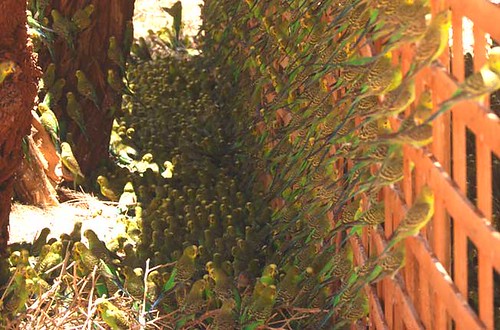Warning: Grafic pictures!
 Populations of budgerigars, crimson chat, cockatiel, and zebra finch have exploded throughout the lower Murchison, about 3 hours northeast of Geraldton, after unseasonably high winter and spring rainfall sparked a breeding frenzy.THOUSANDS of birds have dropped dead at the Overlander Roadhouse, 200km south of Carnarvon, apparently perishing from extreme heat and lack of water.
Populations of budgerigars, crimson chat, cockatiel, and zebra finch have exploded throughout the lower Murchison, about 3 hours northeast of Geraldton, after unseasonably high winter and spring rainfall sparked a breeding frenzy.THOUSANDS of birds have dropped dead at the Overlander Roadhouse, 200km south of Carnarvon, apparently perishing from extreme heat and lack of water.
Temperatures have topped 45C during a two-week heat wave which is thought to have cooked the birds, mostly juvenile budgerigars and zebra finches. Dead birds pile up at the Overlander Roadhouse, 200km south of Carnarvon. Hot weather is suspected of killing the birds after a heatwave pushed temperatures above 40C for over a week. Pictures: Benjamin Strick, Northern GuardianPopulations of budgerigars, crimson chat, cockatiel, and zebra finch have exploded throughout the lower Murchison, about 3 hours northeast of Geraldton, after unseasonably high winter and spring rainfall sparked a breeding frenzy.
Dead birds pile up at the Overlander Roadhouse, 200km south of Carnarvon. Hot weather is suspected of killing the birds after a heatwave pushed temperatures above 40C for over a week. Pictures: Benjamin Strick, Northern GuardianPopulations of budgerigars, crimson chat, cockatiel, and zebra finch have exploded throughout the lower Murchison, about 3 hours northeast of Geraldton, after unseasonably high winter and spring rainfall sparked a breeding frenzy.
The population boom has pushed large numbers of inland species out of their normal range into areas in the Midwest and eastern Wheatbelt that offer limited water and shade, a district manager with the Department of Environment and Conservation (DEC) said.
 Budgies seeking shadow at the Overlander Roadhouse, 200km south of Carnarvon. Picture Benjamin Strick While budgerigars can survive up to 30 days without water, the manager said younger inexperienced birds may have floundered in the extreme heat.
Budgies seeking shadow at the Overlander Roadhouse, 200km south of Carnarvon. Picture Benjamin Strick While budgerigars can survive up to 30 days without water, the manager said younger inexperienced birds may have floundered in the extreme heat.
Adult birds, initially attracted to the shady surroundings of the Overland Roadhouse, appear to have fled when temperatures soared leaving younger animals to perish.
DEC officers said they could not rule out water contamination as a possible cause of death, but believe it is unlikely.
 Dead birds pile up at the Overlander Roadhouse, 200km south of Carnarvon. Hot weather is suspected of killing the birds after a heatwave pushed temperatures above 40C for over a week. Picture Benjamin Strick
Dead birds pile up at the Overlander Roadhouse, 200km south of Carnarvon. Hot weather is suspected of killing the birds after a heatwave pushed temperatures above 40C for over a week. Picture Benjamin Strick
Tony Aroldi, who lives at the Overlander Roadhouse says the birds began dying during a fierce heatwave last week and they are piling up underneath his house.
He said dead birds, mainly budgerigars, were everywhere and the smell was terrible.
"They are just flying and then the next minute you see they're trying to find a shady place,'' he said.
"And then what they do is they get right around the corner and they stay there (in the shade), they never come out to eat, they never come out to drink and they're dying.
"They are dying because of the heat.
"We don't worry about the heat but these birds are dead after flying about for about three days, round and round and round - they look for somewhere to stay, they look for the water.''
Mr Aroldi has contacted the DEC seeking help with the cleanup.
He said he was forced to pull at least 20 kilograms of dead birds out of a generator outside the roadhouse after they had died seeking shelter.
He estimated the death toll in the millions.
"We're talking about in the millions not in the hundreds, trust me in the millions,'' he said.
"I've never seen such a thing like that, you know.
"You can't go near it with the smell.''
A neighbour of Mr Aroldi's had told him birds had fallen into a well and had contaminated the water.
Mr Aroldi said water was an issue at the isolated roadhouse and he had to close down toilets and showers after tourists had emptied the water tanks turning on a tap to try to save the birds.
DEC district manager Brett Fitzgerald said he had never seen bird deaths in the ten years he had worked in the region.
He said it was difficult to estimate how many birds had died, but it was more like 1000, not millions.
While bird deaths on such a large scale are rare, there are documented cases where heat exhaustion has resulted in mass bird fatalities.
In 1931 a heatwave in southern central Australia sent temperatures soaring into the high 40’s, killing "five tonnes" of budgerigars, according to the Parrot Society of Australia.
“Overlander is just a very hot place and unfortunately it is the young birds which just don’t seem to have their wits about them,” Shark Bay district manager for the DEC Brett Fitzgerald said.
“This is the only area that we know about it because it is such a public area.
“I was there yesterday and there are still birds flying around and they look in good condition, but I’m thinking they are probably adult birds that are just a bit smarter about where to feed.''
Overlander staff have provided water for the birds since their arrival on Monday January 5 and visitors should not open extra taps for them.
DEC officers are carrying out water testing in the area and autopsies of a sample of birds will be taken to confirm the exact cause of death.
